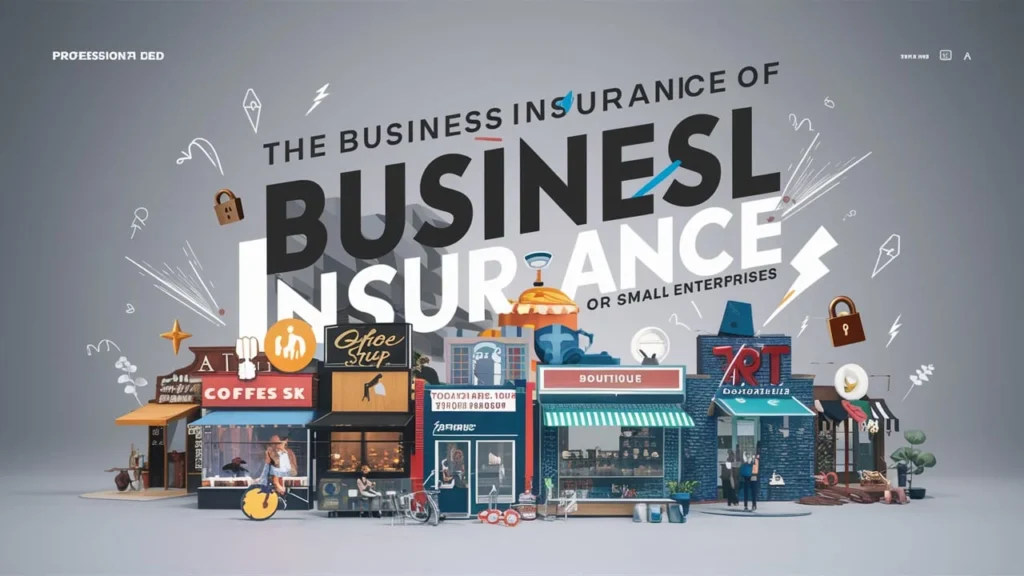Running a small business comes with risks-unexpected lawsuits, accidents, property damage, cyber threats, and even natural disasters. While entrepreneurs focus on growth, marketing, and customer service, one overlooked aspect can mean the difference between survival and financial ruin-business insurance. Without the right coverage, a single lawsuit, fire, or data breach can wipe out years of hard work and investment.
Many small business owners hesitate to buy insurance, assuming it’s too expensive, unnecessary, or complicated. However, business insurance is not just a safety net-it’s a necessity. It protects your assets, employees, and reputation, allowing you to operate with confidence and peace of mind.
This guide will explain why business insurance is essential, the different types of coverage, real-world examples of how insurance saved businesses, and practical tips on choosing the right policy. Whether you run a retail store, consulting firm, restaurant, or e-commerce shop, understanding business insurance can help you avoid financial disaster and keep your business running smoothly.
Understanding Business Insurance: What It Covers & Why It’s Necessary
What is Business Insurance?
Business insurance is a financial protection tool that covers losses, damages, and liabilities that businesses face. Just like personal insurance protects individuals from medical expenses or car accidents, business insurance shields companies from lawsuits, property damage, and operational disruptions.
Who Needs Business Insurance?
Every business-big or small-needs insurance. Whether you run a brick-and-mortar store, an online shop, a consulting firm, or a construction company, you are exposed to risks that could lead to financial loss.
Here are some businesses that must have insurance:
- Retail stores and restaurants (Liability for customer injuries, food poisoning claims, property damage)
- Consultants and freelancers (Legal claims for errors, negligence, or contract breaches)
- E-commerce businesses (Cybersecurity threats, product liability lawsuits)
- Construction and contractors (Worksite injuries, damaged property, liability claims)
- Medical and healthcare providers (Malpractice lawsuits, patient injuries)
Legal Requirements: Is Business Insurance Mandatory?
Depending on the state, industry, and type of business, some insurance policies are legally required. Failing to comply can result in fines, lawsuits, or even business shutdowns.
Common legally required business insurances:
- Workers’ Compensation Insurance – Mandatory if you have employees. Covers workplace injuries.
- Commercial Auto Insurance – Required if your business owns and operates vehicles.
- Professional Liability Insurance – Needed for lawyers, doctors, accountants, and consultants in some states.
Even when not legally required, business insurance protects your financial future and builds trust with clients, customers, and investors.
Key Types of Business Insurance for Small Enterprises
General Liability Insurance
This is the foundation of any business insurance plan. It protects against lawsuits from customers, vendors, or third parties who claim injury or property damage because of your business.
What it covers:
Slip-and-fall accidents in stores
Property damage caused by your business operations
Legal fees and settlement costs in liability lawsuits
Example: A customer slips in a small bakery and breaks their arm. Without general liability insurance, the owner must pay thousands in medical bills and legal fees. With coverage, the policy pays for these expenses, saving the business.
Property Insurance
Protects your business building, equipment, and inventory from fire, theft, vandalism, or natural disasters.
Covers physical assets (computers, furniture, tools, stock)
Pays for repairs and replacements if your property is damaged
Essential for restaurants, retail stores, and manufacturing companies
Example: A fire destroys an electronics store, causing $100,000 in inventory loss. With property insurance, the store owner recovers financially and rebuilds.
Workers’ Compensation Insurance
If your business has employees, this insurance is legally required in most states. It covers:
Medical expenses and lost wages for injured workers
Legal fees if an employee sues over a workplace accident
Rehabilitation costs for injured employees
Example: A construction worker falls from scaffolding and breaks a leg. Without workers’ comp, the company must pay thousands in medical bills and legal fees.
Professional Liability Insurance (Errors & Omissions Insurance)
If your business provides consulting, financial, or legal services, you can be sued for errors, negligence, or breach of contract.
Protects against professional mistakes
Covers legal defense costs
Essential for lawyers, accountants, consultants, and IT professionals
Example: An accountant makes a calculation mistake that costs a client $50,000 in IRS fines. Without professional liability insurance, the accountant must pay out of pocket.
How Much Does Business Insurance Cost?
The cost of business insurance varies based on several factors, including business size, industry, location, and coverage needs.
Average Monthly Cost by Insurance Type
| Type of Insurance | Average Cost (Per Month) | Who Needs It Most? |
| General Liability Insurance | $40 – $60 | All small businesses |
| Professional Liability Insurance | $50 – $100 | Consultants, accountants, IT professionals |
| Workers’ Compensation Insurance | $75 – $200 | Businesses with employees |
| Cyber Liability Insurance | $100 – $300 | Online businesses, tech startups |
| Commercial Property Insurance | $50 – $150 | Retail stores, restaurants, offices |
Cost-Saving Tips:
Bundle policies (Business Owner’s Policy or BOP) for discounts
Increase deductibles to lower monthly premiums
Assess risks carefully to avoid overpaying for unnecessary coverage
How to Choose the Right Business Insurance Policy
- Evaluate Business Risks: Identify potential threats specific to your industry.
- Compare Providers: Research top insurance companies and read customer reviews.
- Understand Policy Limits & Exclusions: Don’t assume all risks are covered-read the fine print.
- Seek Expert Advice: Consult an insurance broker or financial advisor.
Mistakes to Avoid:
Skipping liability insurance – One lawsuit can bankrupt a small business.
Ignoring cyber risks – Cyberattacks are rising, and recovery costs are high.
Not updating coverage – As your business grows, your insurance needs change.
New In-Depth Blog Topics on Business Insurance for Small Enterprises
How to Choose the Right Business Insurance for Your Industry
Business insurance is not a one-size-fits-all solution. Each industry faces unique risks, and selecting the right insurance policy depends on the nature of your business. For example, a restaurant needs food contamination and liquor liability coverage, whereas an IT firm requires cyber liability insurance. In this guide, we will break down industry-specific business insurance policies and provide recommendations on how to choose the best coverage for retail, healthcare, finance, construction, and e-commerce businesses.
Key Sections:
- Understanding industry-specific risks and how to mitigate them
- Insurance requirements for different industries (retail, hospitality, healthcare, tech)
- Comparing custom policies vs. general business insurance
- Cost comparison of insurance premiums by industry
Business Insurance Mistakes That Can Cost You Thousands
Many small business owners either underinsure, overpay, or miss crucial coverage that leaves them financially vulnerable. Understanding common insurance mistakes can save you from financial ruin in case of accidents, lawsuits, or operational disruptions. This guide will discuss costly mistakes such as choosing the cheapest policy, ignoring cyber liability, and failing to update coverage as the business grows.
Key Sections:
- Not having the right coverage for your business type
- Failing to read the fine print (Hidden exclusions that could leave you uncovered)
- Skipping business interruption insurance and the risks involved
- Not updating insurance policies when expanding business operations
- Why underestimating cyber threats can be a costly mistake
General Liability vs. Professional Liability Insurance: Which One Do You Need?
Many business owners get confused between general liability and professional liability insurance. While both protect against lawsuits, they cover different types of risks. General liability covers third-party bodily injuries and property damage, while professional liability (also called Errors & Omissions Insurance) covers claims related to negligence, misrepresentation, and professional errors. This guide will explain who needs each type of coverage, the key differences, and how to determine the best policy for your business.
Key Sections:
- What general liability covers vs. professional liability
- Which industries need each type of insurance (contractors, consultants, service providers)
- How much coverage should you buy? (Factors affecting premium costs)
- Case studies of small businesses benefiting from both policies
The Role of Cyber Insurance in Protecting Small Businesses from Online Threats
Cyberattacks are on the rise, and small businesses are prime targets for hackers. Many entrepreneurs assume that cybercriminals only target large corporations, but 60% of small businesses that suffer cyberattacks close within six months. This article will explain how cyber liability insurance can help protect small enterprises from financial and reputational damage caused by hacking, phishing attacks, and data breaches.
Key Sections:
- Why small businesses are vulnerable to cyberattacks
- Types of cyber insurance coverage (Data breach protection, legal fees, ransomware recovery)
- How much cyber insurance costs and how to choose the right policy
- Real-life examples of businesses losing money due to cybercrime
How Business Interruption Insurance Can Save Your Company After a Disaster
Imagine a fire, hurricane, or flood forces you to close your business for months. Without revenue, can your business survive? Business interruption insurance helps companies cover lost income, pay employees, and cover rent/mortgages while rebuilding. Many businesses don’t realize how crucial this coverage is until disaster strikes. This guide will explain how business interruption insurance works and why every small business should consider it.
Key Sections:
- What business interruption insurance covers
- How long does business interruption insurance last?
- Case study: A small bakery recovering from fire damage
- How much does this coverage cost?
The True Cost of Running a Small Business Without Insurance
Many entrepreneurs believe they can operate without business insurance to save money, but one lawsuit, accident, or disaster can wipe out a business overnight. This article will break down the real financial consequences of not having insurance, using real-life cases of businesses that went bankrupt after failing to insure their assets, employees, or liability risks.
Key Sections:
- Statistics on uninsured business failures
- How much a lawsuit can cost a small business
- Stories of small businesses forced to shut down after disasters
- The long-term benefits of investing in business insurance
Small Business Insurance for Home-Based Entrepreneurs: What You Need to Know

If you run a business from home-whether it’s freelancing, e-commerce, consulting, or selling handmade products-you might assume your homeowner’s insurance policy covers business risks. However, many home-based businesses aren’t protected by personal insurance policies. This guide explains why home-based businesses need dedicated insurance coverage and which policies are best for entrepreneurs working from home.
Key Sections:
- Why homeowner’s insurance won’t cover business-related claims
- Types of business insurance for home-based businesses
- Best insurance providers for freelancers and remote workers
- How much does home-based business insurance cost?
Understanding Workers’ Compensation Insurance: A Must-Have for Small Businesses
If your business has employees, workers’ compensation insurance is required in most states. This coverage protects both employers and employees by covering medical expenses, lost wages, and disability benefits in case of a workplace accident. Without workers’ comp, a business can face lawsuits and financial penalties. This article will explain why workers’ compensation is important, how it works, and how much it costs for small businesses.
Key Sections:
- What workers’ compensation insurance covers
- State laws requiring workers’ comp for small businesses
- How much does workers’ comp cost per employee?
- What happens if a business doesn’t carry workers’ compensation?
Do You Need Business Insurance If You’re a Sole Proprietor?
Many sole proprietors assume that because they work alone, they don’t need business insurance. However, even freelancers, independent contractors, and consultants face risks that can lead to financial loss or lawsuits. This article will explore why self-employed individuals should consider business insurance and which policies offer the best protection.
Key Sections:
- Why freelancers and consultants need liability insurance
- Best business insurance policies for sole proprietors
- How much business insurance costs for self-employed workers
- Case studies of freelancers facing legal claims
Business Insurance for Startups: What New Entrepreneurs Need to Know

Startups operate in fast-moving and high-risk environments, often overlooking insurance while focusing on growth. However, an unexpected lawsuit, data breach, or property damage incident can bankrupt a startup before it gains traction. This guide will help new entrepreneurs understand business insurance essentials and how to choose coverage that fits their budget and business model.
Key Sections:
- Why startups need business insurance from day one
- Essential policies for tech startups, e-commerce, and service-based businesses
- How much should startups budget for business insurance?
- Best business insurance providers for startups
FAQs
Is business insurance legally required?
Yes, some types of business insurance are legally required, depending on your state, industry, and business structure. For example:
- Workers’ Compensation Insurance is mandatory in most states for businesses with employees.
- Commercial Auto Insurance is required if your business owns and operates vehicles.
- Professional Liability Insurance is required for certain licensed professions, such as doctors, lawyers, and accountants.
Even if insurance is not legally required for your business, it’s highly recommended to protect against financial loss from lawsuits, accidents, or property damage.
How much does business insurance cost for small enterprises?
The cost of business insurance depends on several factors, including business size, industry, risk level, and location. Here’s an estimate of average monthly costs for different types of business insurance:
| Type of Insurance | Average Monthly Cost | Best for |
| General Liability Insurance | $40 – $60 | All businesses |
| Professional Liability Insurance | $50 – $100 | Consultants, freelancers, accountants |
| Workers’ Compensation Insurance | $75 – $200 | Businesses with employees |
| Cyber Liability Insurance | $100 – $300 | Online businesses, tech startups |
| Commercial Property Insurance | $50 – $150 | Retail stores, restaurants, offices |
To reduce costs, businesses can bundle multiple policies under a Business Owner’s Policy (BOP), which combines general liability, property insurance, and business interruption insurance into one plan.
What happens if I don’t have business insurance?
Operating a business without insurance can be financially devastating. If an accident, lawsuit, or disaster occurs, your business could face:
Lawsuits and legal expenses from customer injuries or contract disputes.
Out-of-pocket costs for damaged property or stolen equipment.
Fines and penalties for failing to meet insurance requirements.
Loss of credibility, as many clients and investors prefer insured businesses.
For example, a small bakery without liability insurance could be sued if a customer slips on a wet floor and sustains injuries. Without coverage, the business owner would have to pay for medical bills and legal costs, which could lead to financial ruin.
Can home-based businesses get business insurance?
Yes! Home-based businesses still face risks, and a standard homeowners’ insurance policy usually does not cover business-related losses. Home-based business insurance protects against:
Lawsuits if a client is injured at your home office.
Cyber risks if your business handles sensitive customer data.
Theft or damage of business equipment (computers, cameras, inventory).
If you run a home-based business, consider business property insurance and professional liability insurance to safeguard your operations.
Does business insurance cover cyberattacks and data breaches?
Yes! Cyber liability insurance is specifically designed to protect businesses from cyber risks, including:
Hacking, phishing, and ransomware attacks.
Lawsuits from customers affected by data breaches.
Costs of notifying affected customers and restoring lost data.
As cyber threats continue to rise, businesses handling customer data, payment processing, and online transactions should consider cyber liability coverage.
Conclusion:
Business insurance is not just an extra expense-it’s a necessity for protecting your company from financial losses, lawsuits, property damage, and unexpected disasters. Whether you run a brick-and-mortar store, an online business, or a professional consulting firm, having the right coverage ensures long-term stability and peace of mind.
Here’s why business insurance is a smart investment:
It protects your business assets, employees, and reputation.
It helps you comply with legal requirements.
It prevents financial loss from lawsuits, accidents, or disasters.
It builds trust with clients, customers, and investors.
If you haven’t yet secured business insurance, now is the time to evaluate your risks, compare policies, and choose the right coverage. Don’t wait for a lawsuit or disaster to remind you of the importance of insurance-take action today to safeguard your business for the future.
